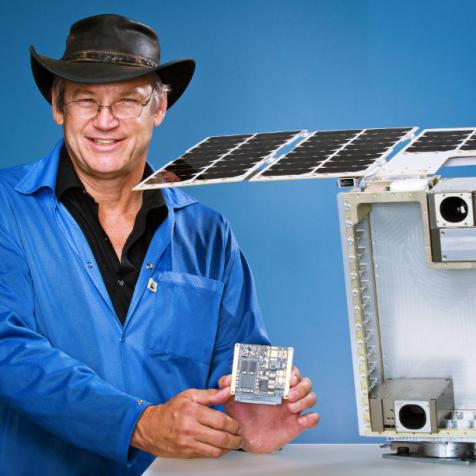
Company Details
Location
Boulder, Colorado
Founded
2012
Ownership Type
Private
Employees
6
Products
Weather Forecasting Technology
Boulder, Colorado with a Washington, D.C. area office in Bethesda, Maryland
Founded: 2012
Privately owned
Employees: 9 (6 in Colorado)
Founder and Chairman Chris McCormick is looking to revolutionize the collection of weather data with satellites that will cover the entire planet with bullseye accuracy.
By the time McCormick sold his previous venture, Golden's Broad Reach Engineering, to New York-based Moog in early 2013, he'd already hit the ground running with his next venture in PlanetiQ.
It picked up where Broad Reach, an aerospace avionics firm, left off. "We started doing R&D on next-generation instruments," McCormick says. "I basically started PlanetiQ to commercialize those fourth-generation instruments."
The instruments in question will track the weather worldwide from an ambitions satellite network. "This is identical to what DigitalGlobe did 20 years ago, but for the weather," says McCormick. PlanetiQ's first satellite will launch in November 2016.
Much of the current weather satellite infrastructure is focused on the equator. "It misses most of North America, Japan and Russia," says McCormick.

PlanetiQ is looking at blanketing Earth from polar circle to polar circle. "People know how to assimilate this data," says McCormick. "The problem is that Earth is still undersampled. . . . The planet isn't instrumented enough to know what the weather is right now."
One massive missing piece is data from the "sun-ocean interface," he notes. "Water is the big energy transport layer."
Infrared sensors can't see through the clouds to tell what's really going on between the sun and the sea. PlanetiQ's technology uses refraction to see underneath. "We won't have to guess -- we'll actually know," says McCormick. From the refraction of waves, weather data like water content and atmospheric density can be "backed out," he explains. "We're getting accuracies of one-tenth of a degree. We're trying to make the data extremely valuable from a forecaster's point of view."
PlanetiQ is manufacturing its instruments in-house and working with partners to make satellites. "A lot of the spacecraft will be built by our neighbor, Blue Canyon Technologies," says McCormick. "I've known these guys for a long, long time."
When it comes to making spacecraft, McCormick says, "Buy the best parts on the planet. We want our satellites to last seven years, not seven months or seven days."
If the plan pans out, expect rapid growth, says McCormick. "We're hoping to hire 10 more people this year. I could see us pretty easily hiring 10 more next year."

Boulder's status as a weather-data and aerospace hotspot doesn't hurt in that regard. "There's a lot of talent," he says. "A lot of the research is right here. UCAR and NCAR are the leaders on the planet on how to incorporate this data in forecasts."
Challenges: Startup cash flow. "We don't get to revenue until we launch," says McCormick, declining to disclose the cost of a launch.
Opportunities: PlanetiQ's market is made up of government and agriculture agencies on every continent, and McCormick says shipping route analysis is one of many possible uses. "You can save lots of time and fuel costs."
In the end, the company plans to fill a big need. "NOAA spends billions of dollars on satellites they don't really launch," he adds. "They hope to fix it and we hope to be part of the solution."
Needs: "Electrical engineers and real-time software developers," says McCormick. "It's getting people to focus on the time domain of writing software." In the satellite industry, "It needs to happen every 10 milliseconds, not 11."
Capital is another need. "We're out raising money from VCs now," McCormick says. "We've got enough money to get a couple of birds launched."
A third: "Making sure the customers are there and willing to buy."

